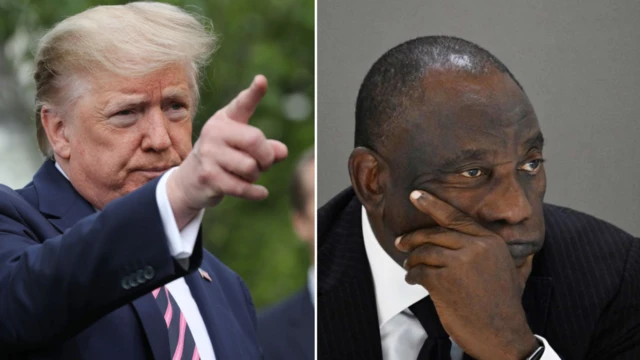In a move likely to deepen global debate over race, land rights, and international diplomacy, U.S. President Donald Trump is set to host South African President Cyril Ramaphosa at the White House next week.
The May 21 meeting, announced by South African officials, comes amid escalating tensions following Trump’s explosive claim that “genocide” is being committed against white farmers in South Africa — an allegation the South African government firmly denies.
The visit will see Ramaphosa in the U.S. from May 19 to May 22. According to Ramaphosa’s office, the trip seeks to “reset the strategic relationship between the two countries.” The White House has not yet commented on the meeting, which will be Trump’s first in-person engagement with an African leader since returning to office in January.
The controversy was further inflamed on Monday, May 12, when the United States welcomed 59 white South African refugees — primarily Afrikaner farmers — under what Trump’s administration described as the beginning of a broader relocation effort. The U.S. government has cited “persecution based on race” as the justification, although Pretoria insists that no targeted violence or discrimination against white citizens exists.
Ramaphosa’s government has maintained that while attacks on white farmers do occur, they are part of the nation’s wider crime problem and not driven by racial motives. Trump, however, reiterated his position on Monday following the refugees’ arrival at Dulles International Airport in Virginia, declaring, “There was a genocide taking place” against white South Africans that international media outlets were deliberately ignoring.
Tensions between Washington and Pretoria have been simmering since Trump returned to the Oval Office in January. In February, he issued an executive order halting all U.S. funding to South Africa, citing “anti-white policies” and “anti-American” foreign alignments.

Land Expropriation Policy Remains Pain Point
The administration’s criticism focuses heavily on South Africa’s land expropriation policy and affirmative action initiatives. The controversial land law, which allows the government to seize unused or underutilized private land without compensation, is seen by critics as a threat to white landowners. Afrikaner advocacy groups warn that the measure could be used to forcibly redistribute their farmland, though the government insists the policy is meant to serve the “public good” by addressing historical injustices and boosting economic inclusion for the Black majority.
In the context of U.S. domestic policy, Trump has rolled back diversity, equity, and inclusion (DEI) initiatives across federal agencies since his return to power. The administration has warned universities and federal contractors that they risk losing funding if they maintain DEI programs that, in Trump’s words, “violate anti-discrimination laws.”
The Afrikaners, descendants of 17th-century Dutch, French, and German settlers, were the architects of apartheid and remain a distinct minority within South Africa’s 62 million population. With roughly 2.7 million Afrikaners and another 2 million white South Africans of other European descent, they make up less than 10% of the national demographic, which is more than 80% Black.
Trump has also accused South Africa of “aggressive positions towards the U.S. and its allies.” He claims that Pretoria supports adversaries like Hamas and Iran. One key point in Trump’s recent executive order references South Africa’s case against Israel at the International Court of Justice (ICJ), where Pretoria accused the U.S. ally of committing genocide in Gaza. The accusation followed Israel’s retaliatory military offensive after Hamas-led militants killed approximately 1,200 Israelis during the October 2023 incursion.
Trump’s alignment with Israel and tough posture on South Africa’s foreign policy underscore a broader ideological divide. As Ramaphosa prepares for his U.S. visit, both leaders are expected to confront their clashing worldviews in what promises to be a tense and consequential dialogue.
READ ALSO: Cedi Strengthens as Adongo Defends Economic Reforms



















